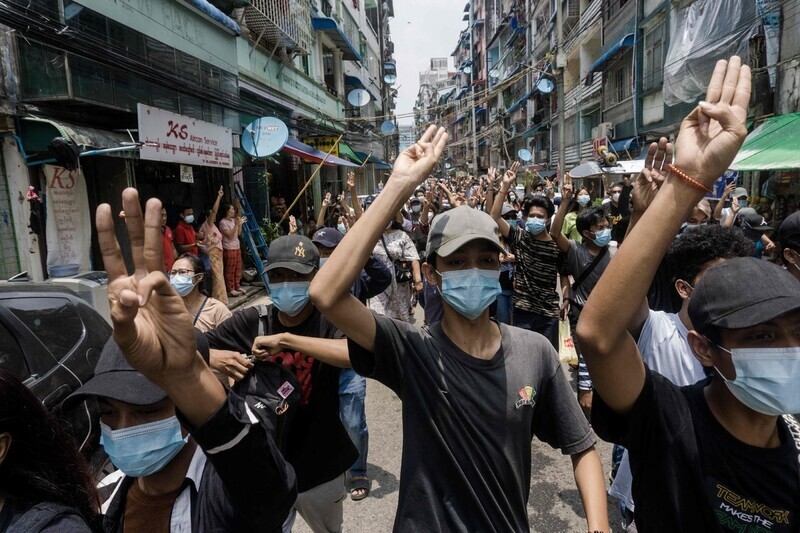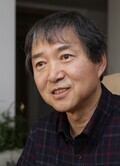hankyoreh
Links to other country sites 다른 나라 사이트 링크
[Column] People of Myanmar will win in end


By Chung Byung-ho, Professor Emeritus of anthropology at Hanyang University
I received a message from a professor at the University of Yangon in Myanmar. They told me they were boycotting classes and had taken to the streets to oppose the country’s recent coup.
Most professors have joined civil disobedience campaigns to fight against having their freedoms taken away again, they explained. They told me the repression was intensifying but pledged to keep fighting to the end and asked for support.
In my mind, I saw the solemn faces of those professors, strangers to me. My heart ached as I imagined the difficult future that lies ahead of them, forfeiting their pay in the short term and facing the longer-term risk of dismissal.
I remembered my first encounter with them in spring 2013. I was visiting the University of Yangon for an international cooperation project to promote community development in Myanmar.
It ended up being difficult for me to actually meet the local professors who were supposed to be my partners. The military regime that had so brutally quashed the country’s democracy uprising in 1988 had forbidden students and outsiders from traveling into and out of university campuses.
I applied for permission to visit, and I managed to get approval after a week’s wait. The shadow of military dictatorship still loomed long, but at that time, there were at least the beginnings of a shift toward a civilian government. Plainclothes soldiers questioned me at the university gates with forbidding eyes.
With no visitors allowed, the campus was empty. Weeds grew profusely, and stray dogs roamed among the lush greenery. It didn’t seem real — how could such a vast wilderness like this exist in the center of a metropolis like Yangon?
All around, I saw buildings crumbling from decades of neglect. As I passed through the darkened doorway, I saw classrooms closed on either side of the long corridor.
The processors and staff were gathered in the teachers’ room. They greeted us like prisoners encountering a rescue team.
The large room, which apparently had been used for seminars in the past, was now thick with dust and cobwebs. Rubbing my fingers against one of the fixtures, I could see the gleam of an old-fashioned teak bookcase. A misty glass case was filled with classic books in several languages. It was like a scene out of “Raiders of the Lost Ark.”
Rangoon University (the University of Yangon’s previous incarnation) used to be one of the elite universities in Southeast Asia. It was the alma mater of Burmese national hero Aung San and UN Secretary-General U Thant. Even former Singaporean Prime Minister Lee Kuan Yew was said to have envied it as an international higher education institution.
But the Myanmar junta cut off exchanges with the US and Europe, which had been critical of human rights issues. Instead, it opted to send a small few international students to Japan.
It barred access to its campuses for fear that students might demonstrate, and it allowed only women to work as professors in humanities and social science fields due to concerns about possible resistance among the male professors.
It was those professors who were now working fervently to bring the university back from its devastation.
The situation was similar at other universities outside of Yangon, including the University of Mandalay. They would be the equivalents of places like Seoul National University, Busan National University and Chonnam National University in South Korean terms.
Can a country truly function when it drives students out of its universities and represses scholarship? The same Burma that once provided rice aid to Korea is now Myanmar, one of the poorest countries in the world.
It’s a path that Korea could very easily have followed. There was a time in our history where soldiers descended on campuses and beat students out of their libraries, toting guns as they watched over the university gates.
Images of Myanmar’s Tatmadaw, the country’s military, rulers today have parallels in the South Korean generals who bellowed that they would blast the clamorous universities to bits with cannons “for the sake of the fatherland and people,” or the presidential security service chief who boasted that the protesting citizens could simply be run over with tanks.
What are they actually trying to protect — their country, or their own power? Having ridden their authority to all sorts of privileges, they may talk big, but they are quaking inside.
Power can’t be kept through force alone. It requires the consent of the people. The three-finger salute of the Myanmar citizens opposing gun-bearing soldiers may seem like a feeble act of resistance, but when the junta has to kill hundreds or thousands of its opponents to hold power, it will inevitably break apart and collapse.
In Korea, what put an end to the Yushin dictatorship were the shots that rang out in Seoul’s Gungjeong neighborhood, where then-President Park Chung-hee was assassinated in 1979.
It was because of the carnage suffered in Gwangju amid the ruthless suppression of May 1980 that tanks were unable to descend on Seoul in June 1987. After a man was put into a coma – and eventually died – when a water cannon jet struck him at Gwanghwamun Square in the fall of 2016, the authorities were unable to use a single drop of water over the millions of candles that burned that winter.
The citizens of Myanmar who have taken the streets in April 2021 have cemented their resolve by imagining a democratic future like Korea. They have stood up against a ruthless military, knowing that if they give up now, they will have to live once again as prisoners under the dark shadow of dictatorship.
They need Koreans’ support and solidarity. The South Korean government has suspended its exports of weapons to Myanmar. Companies should follow the government’s lead rather than aligning themselves with the junta for the sake of immediate profits.
I can remember what I saw eight years ago in the streets of Yangon, as it emerged gradually into the spring breeze of democracy. I see the faces of the young children with their smiling faces as they danced to “Gangnam Style.” Now those same children are in the vanguard of resistance.
Today, the people are crying out in the streets of Myanmar. They have declared, “We will win in the end!”
Please direct comments or questions to [english@hani.co.kr]

Editorial・opinion
![[Editorial] Penalties for airing allegations against Korea’s first lady endanger free press [Editorial] Penalties for airing allegations against Korea’s first lady endanger free press](https://flexible.img.hani.co.kr/flexible/normal/500/300/imgdb/original/2024/0502/1817146398095106.jpg) [Editorial] Penalties for airing allegations against Korea’s first lady endanger free press
[Editorial] Penalties for airing allegations against Korea’s first lady endanger free press![[Editorial] Yoon must halt procurement of SM-3 interceptor missiles [Editorial] Yoon must halt procurement of SM-3 interceptor missiles](https://flexible.img.hani.co.kr/flexible/normal/500/300/imgdb/child/2024/0501/17145495551605_1717145495195344.jpg) [Editorial] Yoon must halt procurement of SM-3 interceptor missiles
[Editorial] Yoon must halt procurement of SM-3 interceptor missiles- [Guest essay] Maybe Korea’s rapid population decline is an opportunity, not a crisis
- [Column] Can Yoon steer diplomacy with Russia, China back on track?
- [Column] Season 2 of special prosecutor probe may be coming to Korea soon
- [Column] Park Geun-hye déjà vu in Yoon Suk-yeol
- [Editorial] New weight of N. Korea’s nuclear threats makes dialogue all the more urgent
- [Guest essay] The real reason Korea’s new right wants to dub Rhee a founding father
- [Column] ‘Choson’: Is it time we start referring to N. Korea in its own terms?
- [Editorial] Japan’s rewriting of history with Korea has gone too far
Most viewed articles
- 160% of young Koreans see no need to have kids after marriage
- 2Months and months of overdue wages are pushing migrant workers in Korea into debt
- 3[Editorial] Penalties for airing allegations against Korea’s first lady endanger free press
- 4[Guest essay] Maybe Korea’s rapid population decline is an opportunity, not a crisis
- 51 in 3 S. Korean security experts support nuclear armament, CSIS finds
- 6[Reporter’s notebook] In Min’s world, she’s the artist — and NewJeans is her art
- 7Bills for Itaewon crush inquiry, special counsel probe into Marine’s death pass National Assembly
- 8S. Korea discusses participation in defense development with AUKUS alliance
- 9Japan’s standards for use of preemptive counterstrike against N. Korea remain unclear
- 10Trump asks why US would defend Korea, hints at hiking Seoul’s defense cost burden